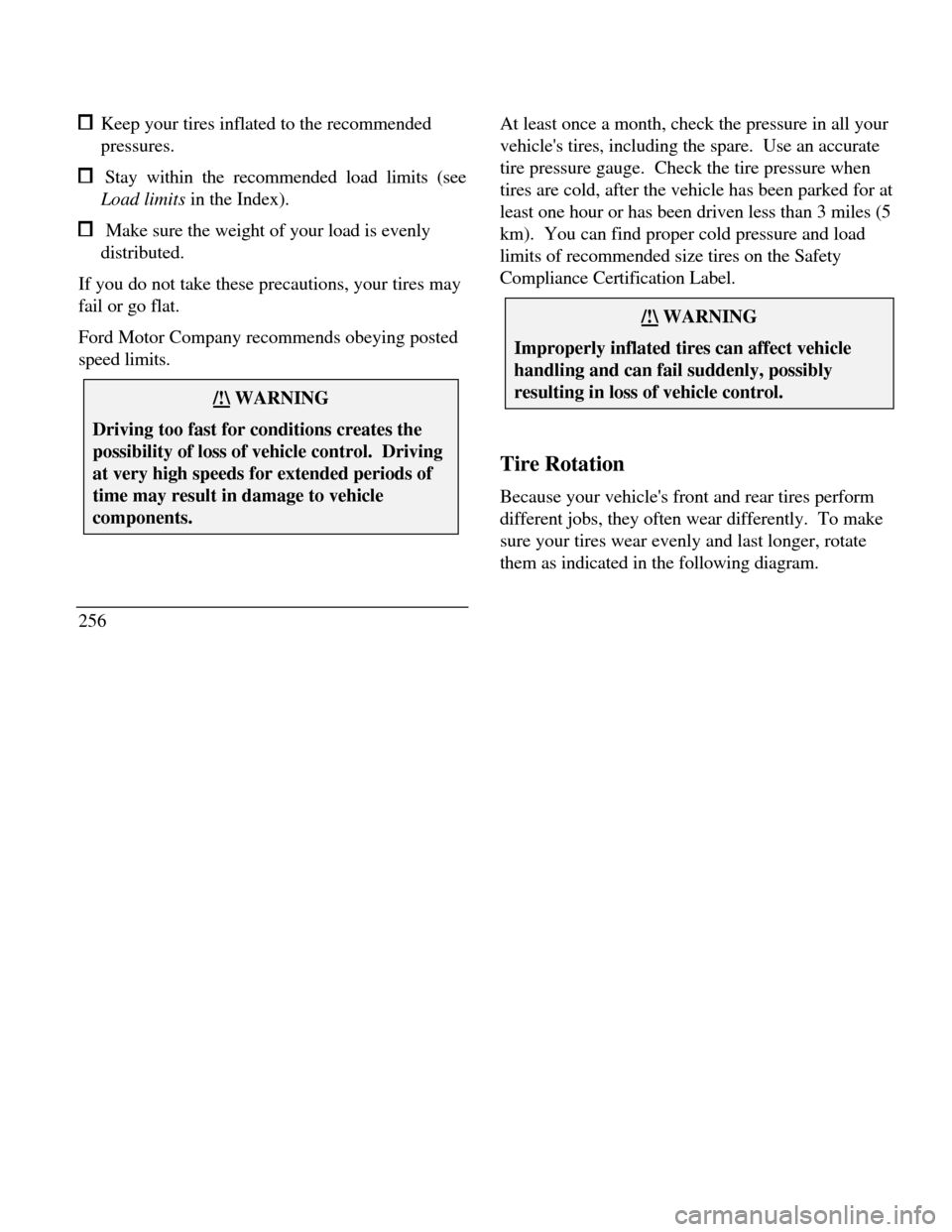Page 246 of 320

Using speed control in hilly terrain Extended use of the A/C, defroster, rear window
defroster and other accessories Underinflated tires Heavy loads Aftermarket add-ons such as bike, ski or luggage
racks, bug deflectors, etc.
Self-Service Pointers
If you choose to do your own fueling, you should
also perform a few simple maintenance routines.
This extra effort will save you additional money and
contribute to the driving efficiency of your vehicle.
The following procedures require only a tire gauge,
a rag, an oil can spout and windshield washer fluid.Check the engine oil at every refueling stopClean the windshield, outside mirrors and
headlights
244 Check windshield washer fluid Check tires for excessive wear or worn edges Check the tire pressure at least monthly
Engine Oil Recommendations
We recommend using Motorcraft oil or an equivalent
oil meeting Ford Specification ESE-M2C153-E and
displaying the American Petroleum Institute
CERTIFICATION MARK on the front of the
container.
Page 257 of 320
![LINCOLN CONTINENTAL 1996 Customer Assistance Guide (temperatures below 32°F [0°C]). State or local
regulations on Volatile Organic Compounds
(VOCs) may restrict use of the most common
antifreeze, methanol. Washer fluids containing non-
methanol a LINCOLN CONTINENTAL 1996 Customer Assistance Guide (temperatures below 32°F [0°C]). State or local
regulations on Volatile Organic Compounds
(VOCs) may restrict use of the most common
antifreeze, methanol. Washer fluids containing non-
methanol a](/manual-img/15/6872/w960_6872-256.png)
(temperatures below 32°F [0°C]). State or local
regulations on Volatile Organic Compounds
(VOC's) may restrict use of the most common
antifreeze, methanol. Washer fluids containing non-
methanol antifreeze agents should be used only if
they provide cold weather protection without
damaging the vehicle's paint finish, wiper blades,
and windshield washer system.
Wiper Blades
Check the windshield wiper blades at least twice a
year. Also check them whenever they seem less
effective than usual. Substances such as tree sap
and some hot wax treatments used by commercial
car washes reduce the effectiveness of wiper blades.
If the blades do not wipe properly, clean both the
windshield and the wiper blades. Use undiluted
windshield washer solution or a mild detergent.
Rinse thoroughly with clear water. Do not use fuel,
kerosene, paint thinner, or other solvents to clean
your wiper blades. These will damage your blades.To make reaching the wiper blades easy, simply turn
the ignition to the ACC position and turn your
wipers on. Wait for them to reach a vertical position
and turn the ignition to the OFF position. Do not
move the wipers manually. Manually moving the
wipers across the windshield may damage them.
Wiper blade replacement
If the wiper blades still do not work properly after
you clean them, you may need to replace the wiper
blade assembly or the blade element. When replacing
the wiper blade assembly, blade refill, or wiper arm
always use a Motorcraft part or equivalent. To
replace the blades, follow the instructions that come
with them.
Tires
Look at your tires each time you fill your fuel tank.
If one tire looks lower than the others, check the
pressure in all of them. Always follow these
precautions:
255
Page 258 of 320

Keep your tires inflated to the recommended
pressures. Stay within the recommended load limits (see
Load limits in the Index). Make sure the weight of your load is evenly
distributed.
If you do not take these precautions, your tires may
fail or go flat.
Ford Motor Company recommends obeying posted
speed limits./!\ WARNINGDriving too fast for conditions creates thepossibility of loss of vehicle control. Drivingat very high speeds for extended periods oftime may result in damage to vehiclecomponents.256At least once a month, check the pressure in all your
vehicle's tires, including the spare. Use an accurate
tire pressure gauge. Check the tire pressure when
tires are cold, after the vehicle has been parked for at
least one hour or has been driven less than 3 miles (5
km). You can find proper cold pressure and load
limits of recommended size tires on the Safety
Compliance Certification Label./!\ WARNINGImproperly inflated tires can affect vehiclehandling and can fail suddenly, possiblyresulting in loss of vehicle control.Tire Rotation
Because your vehicle's front and rear tires perform
different jobs, they often wear differently. To make
sure your tires wear evenly and last longer, rotate
them as indicated in the following diagram.
Page 259 of 320
Do not include the spare tire as part of your
rotation.
For tire rotation intervals, see the Maintenance
Schedule. If you notice that the tires wear
unevenly, have them checked.Rotating the tiresReplacing the Tires
Replace any tires that show wear bands. When your
tire shows a wear band, it has only I/ 1 6 inch (2 mm)
of tread left.A worn-out tire Wear Band
Because your vehicle's tires may wear unevenly, you
may need to replace them before a wear band
appears across the entire tread. Some spots wear
more heavily than others.
257
Page 260 of 320

/!\ WARNINGWhen replacing full size tires, never mixradial, bias-belted, or bias-type tires. Use onlythe tire sizes that are listed on the tirepressure decal. Make sure that all tires arethe same size, speed rating, and load-carryingcapacity. Use only the tire combinationsrecommended on the decal. If you do notfollow these precautions, your vehicle may notdrive properly and safely.Tires that are larger or smaller than your vehicle's
original tires may also affect the accuracy of your
speedometer.
258Information About Tire Quality Grades
New vehicles are fitted with tires that have their Tire
Quality Grade (described below) molded into the
tire's sidewall. These Tire Quality Grades are
determined by standards that the United States
Department of Transportation has set.
Tire Quality Grades apply to new pneumatic tires for
use on passenger cars. They do not apply to deep
tread, winter-type snow tires, space-saver or
temporary use spare tires, tires with nominal rim
diameters of 10 to 12 inches or limited production
tires as defined in Title 49 Code of Federal
Regulations Part 575.104(c)(2).
U.S. Department of Transportation - Tire quality
grades: The U.S. Department of Transportation
requires Ford to give you the following information
about tire grades exactly as the government has
written it.
Page 261 of 320

Treadwear
The treadwear grade is a comparative rating based
on the wear rate of the tire when tested under
controlled conditions on a specified government test
course. For example, a tire graded 150 would wear
one and one-half (1 1/2) times as well on the
government course as a tire graded 100. The
relative performance of tires depends upon the
actual conditions of their use, however, and may
depart significantly from the norm due to variations
in driving habits, service practices and differences in
road characteristics and climate.
Traction A B C
The traction grades, from highest to lowest, are A, B,
and C, and they represent the tire's ability to stop on
wet pavement as measured under controlled
conditions on specified government test surfaces of
asphalt and concrete. A tire marked C may have
poor traction performance. Warning: The traction
grade assigned to this tire is based on braking(straightahead) traction tests and does not include
cornering (turning) traction.
Temperature A B C
The temperature grades are A (the highest), B, and
C, representing the tire's resistance to the generation
of heat and its ability to dissipate heat when tested
under controlled conditions on a specified indoor
laboratory test wheel. Sustained high temperature
can cause the material of the tire to degenerate and
reduce tire life, and excessive temperature can lead
to sudden tire failure. The grade C corresponds to a
level of performance which all passenger car tires
must meet under the Federal Motor Vehicle Safety
Standard No. 109. Grades B and A represent higher
levels of performance on the laboratory test wheel
than the minimum required by law. Warning: The
temperature grade for this tire is established for a tire
that is properly inflated and not overloaded.
Excessive speed, underinflation, or excessive
259
Page 262 of 320

loading, either separately or in combination, can
cause heat buildup and possible tire failure.
Snow tires
The tires on your vehicle have all-weather treads
that provide traction in rain or snow. However,
during the winter months in some climates, you may
need to use snow tires.
Use of tire chains is not recommended. The use of
tire chains could result in damage to your vehicle./!\ WARNINGSnow tires must be the same size and gradeas the tires you Currently have on yourvehicle.Cleaning the Wheels
Wash the wheels with the same detergent you use
to wash your vehicle's body. Do not use acid-based
wheel cleaners, steel wool, abrasives, fuel, or strong
260detergents. These substances will damage protective
coatings. Use tar and road oil remover to remove
grease and tar.
NOTE: Before going to a car wash, find out if the
brushes are abrasive.
If you have whitewall tires that are difficult to clean
with regular detergent, use whitewall tire cleaner.
Follow the directions on the container and rinse the
tires with plenty of clean water.
Securitires (If equipped)
Securitires are designed to allow you to continue
driving your Continental a limited number of miles
when one of your vehicle's tires is at low or even
zero air pressure./!\ WARNINGDo not use aerosol tire inflator/sealer withSecuritires. Doing so may damage the tire'spressure sensor.
Page 263 of 320

See Securitires in the Features chapter for more
information.
Automatic Transaxle Fluid
Under normal circumstances, you do not need to
check the fluid level of the transaxle, since your
vehicle does not use up transaxle fluid. Refer to the
Maintenance Schedule and Record booklet for
replacement intervals. However, if the transaxle is
not working properly - for instance, the transaxle
may slip or shift slowly, or you may notice some
sign of fluid leakage - the fluid level should be
checked.
NOTE: If the vehicle has been operated for an
extended period at high speeds or in city traffic
during hot weather, or pulling a trailer, the vehicle
should be turned off for about 30 minutes to allow
the fluid to cool before checking.Checking the Automatic Transaxle Fluid
With the vehicle on a level surface and the brake fully
applied, start the engine and move the gear shift
selector through all of the gears allowing sufficient
time for each position to engage. Securely latch the
gear shift selector in the P (Park) position. Fully set
the parking brake and leave the engine running.
Wipe off the dipstick cap and pull the dipstick out.
Wipe the indicator end clean. Put the dipstick back
into the filler tube and make sure it is fully seated.
Pull the dipstick out and read the fluid level.
NOTE: Your vehicle should not be driven until
some fluid has been added if the fluid level is below
the bottom dimple on the dipstick and the outside
temperature is above 50°F (10°C). Add only enough
fluid to bring the level above the bottom hole.
261